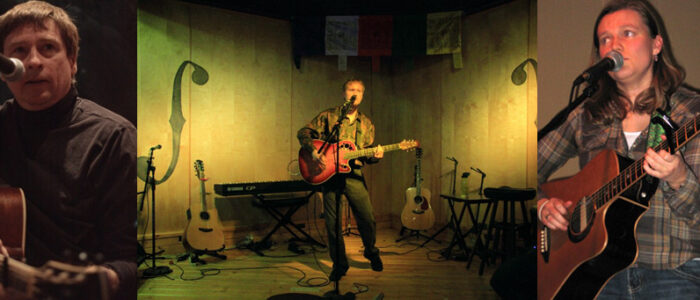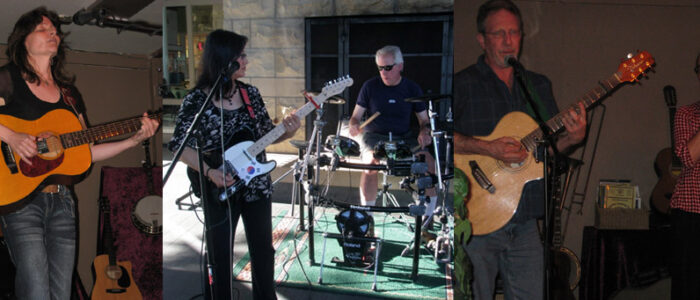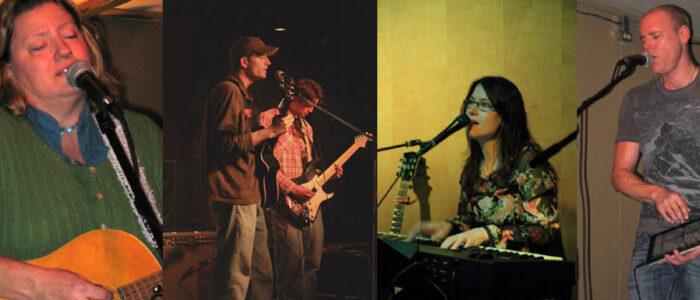(Editor’s Note: Jennifer runs a monthly Music Biz Workshop event for SiS and has agreed to share some of her notes and recommendations in a 3-part series)
You have passion and music and want to do something with them. Here’s the best order in which to proceed:
-
1. Record your songs. Suck it up and either put down the money for professional recordings or barter for them. If you’re a songwriter, find or hire talented musicians (don’t settle with your friends) to perform on the recording.
Some helpful tips:
-
a. If you’re flat broke try the following for fundraising:
b. Hire a producer or bring in a trusted, truthful musician to give you outside feedback. YOU NEED TO GET OUT OF YOUR OWN HEAD during this process which is why your money would be well spent on a producer.
c. Go in with a plan. It will save you lot’s of $ in the long run.
d. Remember QUALITY OVER QUANTITY! If you can’t afford to pay for a full-length album, a four or five song EP is all you need to get your career going and will save you money.
e. Eugene Foley www.FoleyEntertainment.com Has this to say about information for songs regarding commercially desirable structure (the most appealing structure for a sellable song) “One thing to keep in mind, at least for your songs designated as “Singles” (the songs geared towards winning over radio stations, record company executives and music publishers) – try to keep Intros under 10 seconds and try to reach the Chorus between the 40 and 43 second mark. This is very important in the following genres: pop, rock, singer/songwriter, R&B/pop, alternative rock, jazz/pop and punk/pop. If it’s 44 seconds or longer into a song and the Chorus did not kick in yet, you should edit the arrangement accordingly. In rap music, the chorus can come in at the 59 second mark or even a bit later, since the verses are traditionally longer, compared to other genres of popular music. Radio, Record Company and Music Publishing executives pay close attention to song arrangement, as they decide if an artist is developed enough for them to show interest.”
f. A recommendation for order of songs on your disc:
-
i. Your strongest song should ALWAYS be first.
ii. If you will be submitting the cd to record companies, (similar to a demo CD setup) radio stations, etc. the first four to five songs should be in the following order:
-
1. Upbeat (and/or strongest) song
2. Midtempo OR ballad (whichever one is stronger)
3. Midtempo OR ballad
4. Upbeat (if this is your closing song) if there will be others on the disc a Midtempo song.
5. Strong, Upbeat closing song.
iii. This particular song order has been deemed the most appealing and is considered an industry standard.
2. Have songs professionally mastered. Don’t just run them through garageband, have them taken (or emailed in) to a professional mastering studio and watch the magic.
3. Hire a graphic designer and photographer to do the cd art. Don’t let your music be hindered by bad artwork. Check out local colleges for graphic design students or try posting an article on craigslist to find someone if you’re on a tight budget. If you have a strong fan base, ask your fans to get involved. Have them design it for you in a contest or have them vote on it. Fans love being involved. 🙂
4. Duplicate your music. Start small, 100 cds is a good starting point. Discmaker’s 1000 cds deal is tempting BUT it takes a LONG time to sell/ get rid of 1000 cds. I would recommend having two sets of cds- 1 printing for press kits and 1 printing for merchandise.
-
a. The press kit printing should include your contact information (email, name, phone number and physical [use a PO Box] mailing address) on the physical cd, on the back of the cd and near the liner notes on the inside of the cd. Get it in a standard jewel case WITHOUT plastic wrap.
b. Merchandise copy can be in whatever format you’d like- just make sure you have a UPC code on it. If you don’t have one, CDBABY.com can get you a UPC for $20
c. Studio North Duplication can do small order in a short turn time numerous different cases relatively cheap PLUS they’re based out of Lynnwood, which will save Seattle-ites on shipping costs. http://www.studionorthduplication.com/
5. Register your copyright
-
a. Also check with your performing rights organization to see what needs to be done to have your song accounted for so you can collect any royalties you generate.
-
i. If you don’t have a PRO, get one- ASCAP, BMI or SESAC
6. To CD release party or to not CD release party? You’ve just finished your project and are super excited to share it. Here are a few things to keep in mind:
-
a. You’re either a starting artist with a small fan base or revamping your current direction into a new style do you have enough fans to be the headliner that the venue would want you to be? This typically means bringing in enough people to make the venue happy.
b. A proper, successful CD release (the type that record labels do) involves AT THE VERY LEAST 10 weeks of prep time Check out the Music business toolbox at http://www.musicbusinesstoolbox.com/ to see the checklist and more. I highly recommend purchasing this product! Worth every single cent!
c. It typically takes 2-3 months to book a release show.
d. Will you have everything digitally in line with your physical release?
e. Here’s a great article on Music Think Tank with more CD release tidbits http://www.musicthinktank.com/blog/10-key-to-dos-for-a-successful-cd-release-party.html
f. Sometimes the smarter thing to do is simply start selling cds at shows and send out an email announcing that your cd is now available.
7. Digital distribution. If you are having a CD release party try to make sure that your digital distribution date happens around the same time. The top used digital distribution services are:
Now that you have your music in your hand you have a tangible product to sell. One VERY important thing to remember is that you are not selling simply music, you are selling yourself. Next up in Part 2 is most likely the hardest, most time consuming, the most confusing and the most frustrating- Marketing.





